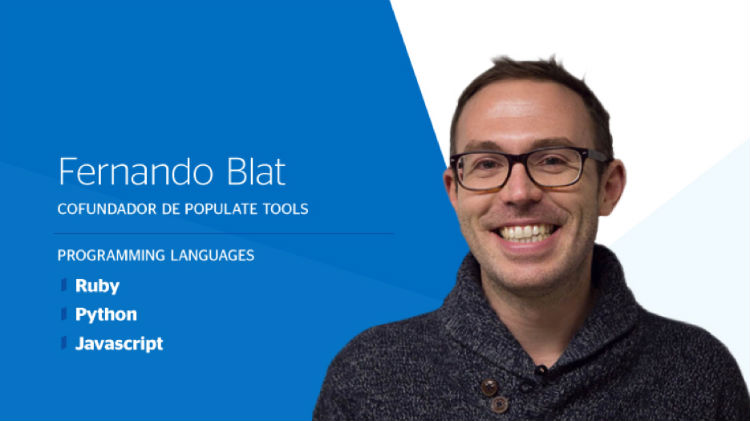Actuable, Fernando Blat‘s first project as a co-founder, was a Spanish platform for citizen campaigns that was acquired by the American company Change.org one year after its launch. Toldo arose as a management tool to help private individuals and small companies open their online stores more easily. Populate is a platform that helps citizens and organizations to understand and interact better with the world around them, and is Fernando’s current project. He tells us more about it in this interview.
Given your trajectory to date, how far do you believe technological development can contribute to the social good?
People say that development and technology are great ways of amplifying anything they’re applied to. For example, at Actuable we saw the impact of enabling people to set up petitions and gather support. Now at Populate we’re seeing the effect of helping municipalities carry out citizen consultations so they can learn their opinions at first hand.
Tell us what Populate is and how you ended up being its co-founder.
Populate is a design and programming studio centered on creating products and projects around transparency, citizen participation and open data. It was set up by Álvaro Ortiz and myself because we wanted to create a company based on these very different areas, and we considered there were some interesting opportunities out there.
At Populate we work for third parties, or we develop our own products such as Gobierto, an open source platform for open government that helps institutions comply with the Transparency Act and get closer to the citizens.
Another project we’ve created for another customer is España en Cifras (Spain in figures), a snapshot of the municipalities in Spain based on the main socio-demographic and economic indicators such as unemployment, population, crime rates or active debt. The visualization of these data makes it easier to understand the reality of a municipality from an objective point of view.
The website and database of the Panama papers Panama papers has been another of our main jobs. The task here was to contribute to the graphic exploration of the people, intermediaries and all the other entities that appeared in the leaked material.
Complete the phrase: “A developer is…”
A person who has to be able to understand any kind of problem and break it down into its smallest components to be able to implement a solution.
If you hadn’t been a developer, what other career would you have chosen?
Biologist, mathematician, physicist. Something to do with science.
What’s the secret code you use for your professional success?
Unfortunately, the world of programming changes really fast and you have to make sure you stay up to date, because if you don’t you may get left behind. In my case, I opted for patience and didn’t let myself get carried away by passing trends.
What do you think has been the most important moment in your whole career?
I think having to operate as a self-employed worker makes you really mature – both when I became self-employed, or now with Populate –, because you become aware of all those things that have nothing to do with programming, but which are important for being a good professional.
A person who inspires you? Why?
I think any leader of an open source community is someone to be admired. To give an example, David Henemeier, creator of Ruby on Rails, who’s a person with a very strong character and opinions, but who has undoubtedly succeeded in sticking to his ideas and leading the Rails community to the present
What tools do you consider essential right now?
-
A good text editor, one you feel comfortable with and that makes you productive. In the end you spend more than half your day on that program.
-
Github–I couldn’t imagine my professional life now without Github.
-
Continuous integration systems in the cloud such as TravisCI or CircleCI.
-
Technical books and online documentation.
-
And of course Stack Overflow.
Are you a follower of Scrum, Agile, or do you prefer other methods?
I like Agile much more than Scrum. It’s a way of approaching projects that involves very short iterations that you test and validate constantly with the customer, so whenever there’s a misunderstanding – and there always are – it’s much easier to rectify and take another look at the situation without having to hold up the project.
From the technical point of view, Agile also means approaching problems that you resolve very gradually by simplifying them to the maximum, so you can then take small steps towards the final solution, by testing, for example.
Do you use APIs? Which ones and why?
Of course I do! All kinds! At Populate we use the INE (Spanish National Institute of Statistics) API a lot to work with data on demography, debt and much more.
At Gobierto we’re integrated with the politicians’ schedules and open data portals like Socrata. We’ve received the annual Socrata award for this project for the Catalan regional government.
We also use the Github API for our development workflow, and we use APIs to send SMS and push notifications to cellphones and so on.
In the end APIs are now very commonplace in the daily work of any programmer.
Star Wars, Star Trek or none of the above?
Star Wars, hands down!
What’s your favorite operating system for desktops and cellphones and your must-have programming language?
I’ve used Mac computers for a long time now, although before I used Linux. I’ve never liked Windows. For my cellphone I’ve used Android so far.
I have several favorite programming languages. I’ve spent my whole professional life programming in Ruby, although I also know Python and particularly Javascript, as you have no alternative if you’re doing website programming.
A tip for young developers?
Be curious, investigate and try to understand things. Get involved in personal projects that satisfy you. Learn to pitch and communicate better, in person and online. When you take on a project, think about who’s going to use it and whether that makes you happy. Go to meetups and conferences. Give classes.
Are you interested in financial APIs? Discover all the APIs we can offer you at BBVA










